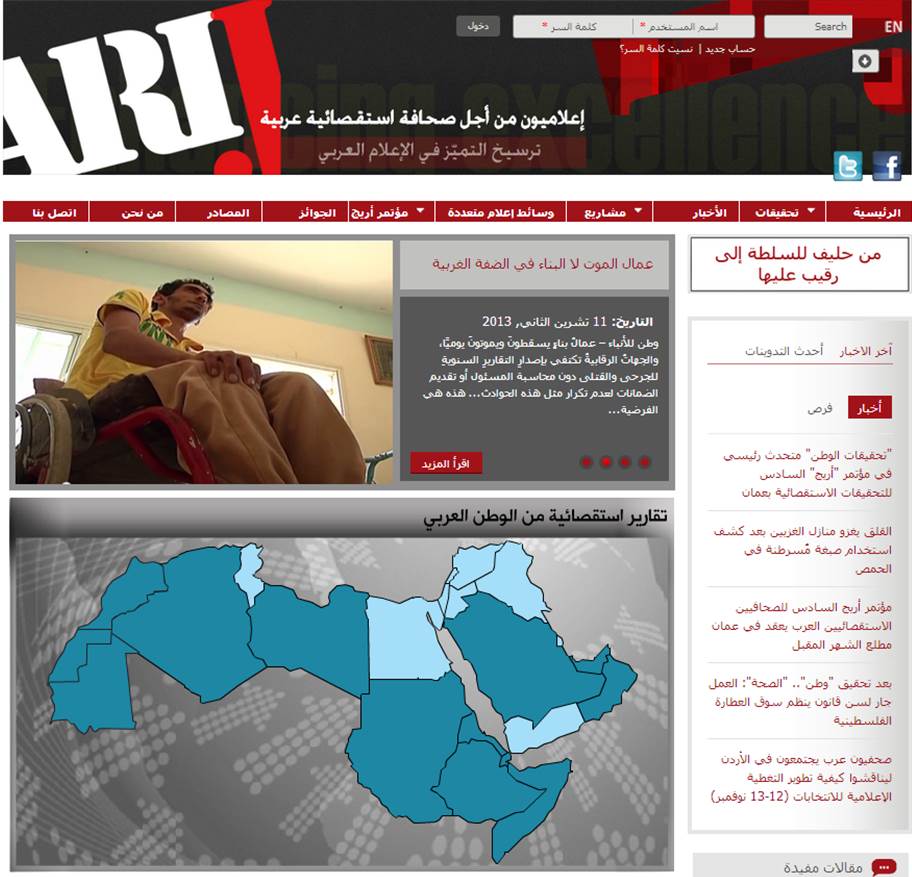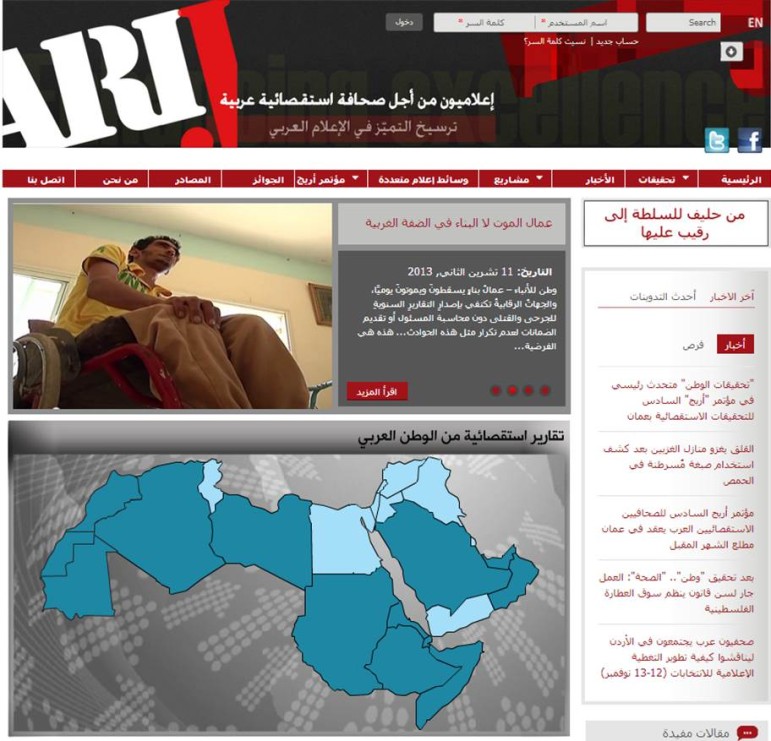The 6th annual conference of Arab Reporters for Investigative Journalism (ARIJ) opens in Amman, Jordan, today. As hundreds of journalists and educators gather from Tunisia to Iraq, ARIJ’s Executive Director Rana Sabbagh pauses to look at the failed hopes of the Arab Spring and the tough road ahead for journalists in the Middle East and North Africa. — The Editors
AMMAN – Three small but grim pieces were added recently to the great Arab jigsaw – and none of them should surprise us.
Last week, an Egyptian court in Alexandria sentenced 14 women to 11-year prison terms for carrying anti-government banners at a demonstration last July.
In Dubai, an American was charged with violating internet laws. Al Jazeera reported that he had posted a parody video about youth culture in the emirate.
And in Beirut, four journalists from the independent al-Jadeed TV were beaten up by Customs agents after their boss refused to be interviewed for an investigative report on allegations of corruption at Beirut airport customs.
Leaving aside the shocking severity of the Egyptian sentences, these moves amounted to a blatant attack on free speech, the one gain that Arab protesters from Tunisia’s Bourguiba Avenue to Egypt’s Tahrir Square believed they had bought and secured at the start of revolutions and historic upheavals that erupted in much of the region since 2011.
They – and we – now need to think again.
Egypt in particular has set the tone for the rest of the region since June when the army toppled Mohammed Morsi, the country’s first elected Islamist president. Its new law, restricting demonstrations, significantly reduces the space for criticism of the military-led government. So do draft provisions in the new constitution for military trials of civilians. All this, of course, casts a long shadow over parliamentary and presidential elections elections, still scheduled for next year.
What kind of campaign will it be, where free assembly has been curtailed, anti-government slogans and criticism crushed, and the majority of the mainstream press does as it’s told without question?
In the Arab world, we know exactly what that campaign will look like. The same as it’s always looked.
Let me tell you how I think it will go from here. The row-back has begun in earnest; in Egypt, Jordan, Bahrain, Iraq, Lebanon, and elsewhere. Free speech – always a lonely and sickly child in the Arab world – is already back in intensive care throughout the region.
Street protests will gradually die out in most of the capitals that have seen upheavals over the past three years.
Dissenters will continue to be arrested and given harsh sentences. The compliant will be rewarded.
Sustained government propaganda will convince any waverers that political stability and economic prosperity are far more important than personal freedoms, rule of law, universal human rights, and democratic values.
Despite the wishful thinking of the crowds, the final chapter of the Arab Spring is being written: it is about over.
Next year’s annual report by Freedom House will reflect the regression in media liberties and freedom of expression across the region, as emboldened Arab leaders try to restore the old order.
Egypt’s military rulers are intent on choking freedom. Security in Libya and Syria is worsening, political tension is growing in Tunisia and freedoms are being diluted in Jordan.
Business as usual has therefore returned to much of the region.
Judicial authorities are resorting again and again to the same articles in the penal code as a repressive tool against free speech, instead of looking into their allegations and fixing the laws inherited from old autocratic governments that criminalize criticism of public figures and institutions
Today, serious, professional journalists are being punished across the region for doing their job. In Iraq, they face a double threat: from armed gangs gunning them down and from prosecutors, more concerned with going after journalists than bringing criminals to justice.
Since early October this year, four journalists have been assassinated in Mosul, the capital of Iraq’s Nineva Province . At the same time, Iraqi prosecutors have stepped up criminal prosecutions of journalists for defamation and have increased other harassment of journalists, especially those covering politically sensitive topics such as poor security, corruption, and basic public services.
In Tunisia, prominent activists like Walid Zarrouk, a union leader who criticized the politicization of prosecutions, was briefly detained. And prosecutors have summoned Zuheir al-Jiss, a journalist, for moderating a radio program in which a guest criticized Tunisia’s president. Zied al-Heni, who had protested at the arrest of a cameraman for filming an egg-throwing attack on the culture minister, was also ordered to appear before prosecutors.
In Jordan, where article 15 of the 2011 Constitution guarantees free expression, the authorities continue prosecuting media professionals and political activists on criminal charges relating to free speech.
A proposal by the government, at the recommendation of King Abdullah II, to restrict the jurisdiction of the quasi-military State Security Court to terrorism and four other serious crimes – espionage, treason, currency counterfeiting, and drug offences – has not been implemented.
There is also serious doubt whether the country’s largely conservative and apolitical parliament will amend or eliminate penal code provisions, used to try peaceful protestors on terrorism-related charges.
Against this bleak outlook, the 6th annual conference of Arab Reporters for Investigative Journalism (ARIJ) opens in Amman, today.
More than 360 journalists, editors, and media professors will debate the worrying regression in freedoms across the region and the growing wave of disinformation and character assassination, while engaging in frank discussions on a question of key importance: why do the Arab media prefer to sit on the warm laps of the powerful instead of serving their society as the watchdogs they should be?
 Rana Sabbagh is executive director of Arab Reporters for Investigative Journalism (ARIJ), the leading media support network promoting “accountability journalism” in newsrooms and among editors and professors in nine Arab states: Jordan, Syria, Lebanon, Egypt, Iraq, Palestine, Bahrain, Yemen, and Tunisia.
Rana Sabbagh is executive director of Arab Reporters for Investigative Journalism (ARIJ), the leading media support network promoting “accountability journalism” in newsrooms and among editors and professors in nine Arab states: Jordan, Syria, Lebanon, Egypt, Iraq, Palestine, Bahrain, Yemen, and Tunisia.


